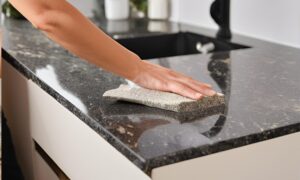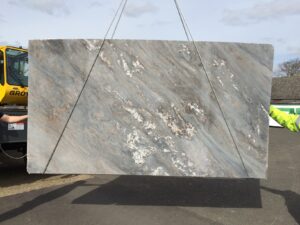Will Granite Crack In Cold Weather? – Caring for Stone in Winter
Stone is weather resistant and incredibly durable, making it ideal for outdoor use. It does still need some care though, to keep it looking its best.
What’s The Least You Can Get Away With?
Stone tiles or slabs will survive a bit of neglect much better than wood or plastic. Stone is largely unaffected by rain, sun and snow. You can typically leave stone paving outside for a decade and still clean it off and use it. However, this is not recommended as slabs can be pushed aside or even cracked by roots, stained by moss and eventually worn down by running water. All these problems are easier to solve if tackled early, so we recommend a half hour of maintenance every month or three.
What To Do This Winter
If you’re not using an area, there’s little you need to do over the winter to keep your stone tiles or patio in good condition. You can make spring cleaning significantly easier, however, if you follow a few preventative steps.
Blow Away Leaves
Sweep up any autumn leaves and other debris. If the leaves are allowed to pile up and rot over the winter, the area will be much harder to clean in spring. The developing leaf mould is also an ideal home for insects and small animals. While they can’t damage stone, they may burrow between the stones over the winter, leaving you with a buggy problem in spring.
Pull Up Weeds and Moss
Just because it’s too cold to sit outside doesn’t mean that plants stop growing entirely. It’s worth removing any moss growing on the stone and any plants pushing up between the cracks when you spot them, so they don’t have time to get established.
Check Drains and Gutters
While water can wear away stone, it takes a long time. Overflowing drains or gutters than drip onto your patio can easily cause dirt to build up. Getting rid of the mess in spring can be frustrating, particularly if a dripping gutter has left a dirty line at the edge of an overhang.
Avoid Harsh Chemicals
Most stone tiles and patio slabs can be easily maintained with a firm brush, soap and water. Harsh chemicals can damage the seal on porous stones, making staining more likely. In some cases, abrasive chemicals can damage the stone itself. This is particularly true for more delicate stones like marble and limestone. While these stones can endure outdoor weather for years, chemicals – even mild acids, like vinegar – can cause pitting or dulling of the surface.
Use Salt, Not Grit
Grit can scratch stone, so if you need to increase traction during an icy or snowy winter, lay down salt instead. Ordinary kitchen salt lowers the freezing point of water so ice cannot form. It’s best to salt a path before the ice forms. Salt may leave white residue, but don’t worry – this will wash away with the next rain or can be cleaned off with water.




